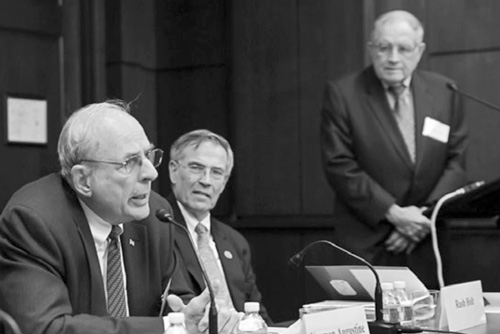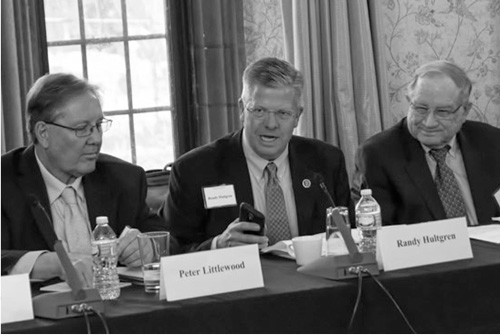A recent Academy report, Restoring the Foundation: The Vital Role of Research in Preserving the American Dream, argues for the importance of research, especially basic research, in maintaining America’s competitiveness and the health and prosperity of its citizens. Chaired by Norman R. Augustine (Lockheed Martin Corporation, retired) and Neal Lane (Rice University), the report calls attention to the United States’ comparative decline in research investments over the past decade and offers recommendations for sustaining long-term thinking in science and technology (S&T) policy, and for strengthening the partnership among government, universities, and industry (GUI).
On September 16, 2014, the Academy released Restoring the Foundation at a press conference and Congressional briefing in Washington, D.C. Rush Holt, Representative for New Jersey and Cochair of the House R&D Caucus, spoke at both events, remarking that “Americans deserve a more optimistic vision for our country and for our government. We should match, I think, the amazing potential that our entrepreneurs and engineers present us with the support of modern infrastructure and direct support where appropriate. This will create new technologies and develop alternate energy sources, or in the words of this report, it will make the American Dream available for all.”
Project committee member Bart Gordon, former Representative for Tennessee and former Chairman of the House Committee on Science and Technology; Association of American Universities President Hunter Rawlings; and Association of Public and Land-grant Universities President Peter McPherson also applauded the report, supporting its core sentiment that scientific and technological advances, which are grounded in basic research, are fundamental to the prosperity, health, and security of the American people.
Nearly one hundred university leaders, directors and staff from federal research agencies, representatives of professional societies and the national laboratories, and members of Congress and their staffs attended the release events, which were webcast live via the Academy’s website. The report’s release was covered in Science, The Chronicle of Higher Education, U.S. News & World Report, and other media outlets. Both the report and video from the release events are available on the Academy’s website at www.amacad.org/restoringthefoundation.
 |
| Norman Augustine (Lockheed Martin Corporation, ret.), Rush Holt (U.S. House of Representative), and Neal Lane (Rice University) |
Building Support
The project committee is engaging in extensive dialogue in Washington, D.C., and across the country to identify promising pathways to implement the report’s recommendations. Committee members have arranged more than thirty-five meetings with Congressional offices from both major parties to discuss the report and explore possible mechanisms to encourage bipartisan cooperation on research issues. Neal Lane also presented the report to the National Science Board and to over one hundred administrators and staff at the National Institute of Standards and Technology.
In addition, two committee members – Nobel Laureates Thomas R. Cech (University of Colorado Boulder) and Steven Chu (Stanford University; former U.S. Secretary of Energy) – highlighted the report’s message in an October 15 op-ed in The Wall Street Journal, “How to Stop Winning Nobel Prizes in Science.” They emphasized the need for steady federal funding of basic research, writing that “vacillation in the government’s commitment to basic research makes strategic planning all but impossible for the nation’s research institutions including universities, medical schools and national laboratories, and the companies they partner with . . . In short, not only must we invest, but also we must generate a framework in which that investment can thrive.”
The Academy has assembled a coalition of scientific and business organizations to establish a task force on long-term planning on science and technology policy, with the goal of bringing together S&T-focused organizations to deliver a common message to policy-makers and the American people. Participating organizations include the Association of American Universities, the Association of Public and Land-grant Universities, the American Association for the Advancement of Science, the Alliance for Science and Technology Research in America, Research!America, the National Academy of Engineering, and the Institute of Medicine of the National Academies.
Maintaining a Focus on Critical Issues
The Academy is convening an extensive series of symposia and workshops across the country to promote dialogue among leaders in government, universities, and industry, and to identify ways to enhance cooperation among these sectors. Some of the topics that will be explored include the sustainability of the biomedical research enterprise; university-industry research partnerships in biomedicine; research partnerships in information technology; and new models for technology transfer and intellectual property management.
 |
| Peter Littlewood (Argonne National Laboratory), Randy Hultgren (U.S. House of Representatives), and Neal Lane (Rice University) |
An initial workshop was held on November 6, 2014, at the University of Chicago and focused on collaborations among national laboratories, universities, and industry. The participants included U.S. Representatives Randy Hultgren (R-IL) and Bill Foster (D-IL), Argonne National Laboratory Director Peter Littlewood, Fermi National Accelerator Laboratory Chief Operating Officer Timothy Meyer, and thirty representatives from national laboratories and their university and corporate partners. The workshop identified promising new models for research partnerships and highlighted the benefits of colocalizing research and development activities to maximize the potential for new innovations. Representative Hultgren spoke about the importance of providing entrepreneurship opportunities for university researchers, remarking that “If there is not a way for our researchers to give the American Dream a shot and build a business . . . [that] is talent lost.”
The Academy is also working with the university community to identify steps that could be taken on campuses across America to advance the recommendations from Restoring the Foundation. Committee member Venkatesh Narayanamurti (Harvard University) presented the report at the November 2014 annual meeting of the Association of Public and Land-grant Universities as part of a panel moderated by Kelvin Droegemeier, Vice President for Research at the University of Oklahoma and Vice Chair of the National Science Board. The Academy is now working with Dr. Droegemeier to organize a conference in the summer of 2015 that will convene university research vice presidents and state officials from NSF EPSCoR (Experimental Program to Stimulate Competitive Research). The objective of the meeting is to foster new interinstitutional collaborations that encourage the sharing of experience and the rapid adoption of innovative policies and practices.
The conversations taking place across the country will provide a venue for a system-wide assessment of progress on overcoming barriers to the discovery of new scientific knowledge and technologies, the translation of these discoveries to business and industry, and the training of a future STEM workforce that is commensurate with maintaining America’s position of scientific leadership in the world. Together, they will ensure that Restoring the Foundation – and similar reports from other organizations – do not fade from the collective consciousness, but continue to drive thoughtful discussions for years to come.
More information about Restoring the Foundation may be found on the Academy’s website at www.amacad.org/restoringthefoundation. The Academy gratefully acknowledges support from the Alfred P. Sloan Foundation, the John D. and Catherine T. MacArthur Foundation, and the Hellman Fellows Fund.